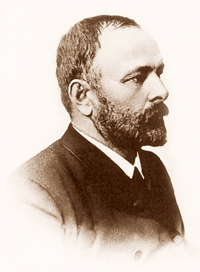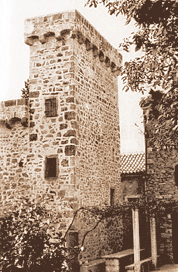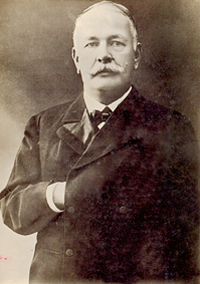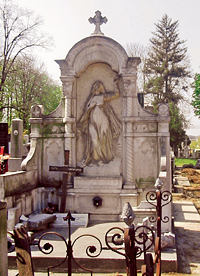Life, novels
ONE HUNDRED YEARS FROM THE DEATH OF SIMO MATAVULJ (1852-1908), THE GREAT SERBIAN WRITER
The Eternal Invader of Serbian Literature
The most important period of his forming were the years spent on the praised court of Janković Stojan, in Ravni Kotari, whose ancestor was his most valuable teacher. He spent the most beautiful time of his youth in Herceg Novi, for him “the most beautiful area of Serbian land”. He started writing by the command of Prince Nikola, the ruler and poet, who saw a great writer in him. At the end of a long, winding road, there was the long-desired Belgrade, where he will find his place among great people of Serbian culture and where he will stay forever
By: Jovo Bajić
 One hundred years have passed from the death of the famous Serbian writer Simo Matavulj. The year of 1908 was fateful for Serbian literature. First, from Dubrovnik arrived the news that Milovan Glišić died on January 20th, trying to find the cure for his disease. The 40-days commemoration was prepared for him in Belgrade, and the speech was prepared by Simo Matavulj, who was the President of the Literary Society. Matavulj did not speak on Glišić’s commemoration because he suddenly died on February 20th. Both of his brothers in pen were mourned by the sick Radoje Domanović, who died on August 4th. In the end of 1908, on November 4th, also died the writer Milan Đ. Milićević. One hundred years have passed from the death of the famous Serbian writer Simo Matavulj. The year of 1908 was fateful for Serbian literature. First, from Dubrovnik arrived the news that Milovan Glišić died on January 20th, trying to find the cure for his disease. The 40-days commemoration was prepared for him in Belgrade, and the speech was prepared by Simo Matavulj, who was the President of the Literary Society. Matavulj did not speak on Glišić’s commemoration because he suddenly died on February 20th. Both of his brothers in pen were mourned by the sick Radoje Domanović, who died on August 4th. In the end of 1908, on November 4th, also died the writer Milan Đ. Milićević.
These three writers – Glišić, Domanović and Milićević – where domestic people, who grew in Serbia. Matavulj’s life path was different, longer, and winding. It led this eternal invader to many places where lived the Serbian people in the second half of the 19th century. He was born on September 14th (or 12th) in 1852 in the “suburbs” of Šibenik. This is how he described the people among which he grew: “The people are a mixture of old-time Croatians and Serbian invaders from Bosnia and Herzegovina. ’The fraud sun of the south’ (as says Daudet in Tartarin) makes you imagine and feel everything in Šibenik exaggerated; it seems that restless dreams sleep, and that you dream too much when you are awake; it seems that imagination does not have enough life and that it seeks for it somewhere where it does not belong.”
His father Stefan, a cattle merchant, died when he was 49, and his mother re-married. He finished primary school in Šibenik, where classes were in Italian, and he went to a Serbian school at the same time. Then he went to high school, where classes were also in Italian and he learned the language very well. He interrupted his high school education and he went to Krupa Monastery, where his uncle Serafim was a prior. Sima’s restless nature could not accept the monastic way of life. He left the monastery and he went to a two-year teacher’s school in Zadar, in the so-called Illyric Teacher’s College, where he got a scholarship. He finished school in 1871 and he became a teacher in village Đevrske, north from Šibenik and then he got the position of a teacher in Islam Grčki in Ravni Kotari.
ON JANKOVIĆ’S COURT
 In Islam Grčki, near the school, was the court of the Janković family, built by Serdar of Kotar, Stojan Janković, who was sang about with the sound of gusle. At that time, Ilija Dede Janković lived on the court, with his wife Jelena, the descendant of Stojan Janković, an important person of that part of Dalmatia. He spoke several world languages, he read books, he had a rich library, and he was a man of Renaissance ideas. Even though the school where he worked had a decent apartment for a teacher, Matavulj accepted the invitation of the Janković couple, and he moved to the court. He became the count’s secretary. He could use the court library in which were all important Serbian books published in the 18th and the 19th century, as well as works of the greatest European writers in Italian and French (Voltaire, Rousseau, George Sand, Manzoni, Guerrazzi, Grossi, Fénelon, Bossier, Chateaubriand, Hugo, Lamartine, Delavigne, Musset, Dimas, Flaubert...). Janković’s court was the greatest school for young Matavulj, where he learned everything from his most important teacher Ilija Dede Janković and absorbing everything he could read in his library. In Islam Grčki, near the school, was the court of the Janković family, built by Serdar of Kotar, Stojan Janković, who was sang about with the sound of gusle. At that time, Ilija Dede Janković lived on the court, with his wife Jelena, the descendant of Stojan Janković, an important person of that part of Dalmatia. He spoke several world languages, he read books, he had a rich library, and he was a man of Renaissance ideas. Even though the school where he worked had a decent apartment for a teacher, Matavulj accepted the invitation of the Janković couple, and he moved to the court. He became the count’s secretary. He could use the court library in which were all important Serbian books published in the 18th and the 19th century, as well as works of the greatest European writers in Italian and French (Voltaire, Rousseau, George Sand, Manzoni, Guerrazzi, Grossi, Fénelon, Bossier, Chateaubriand, Hugo, Lamartine, Delavigne, Musset, Dimas, Flaubert...). Janković’s court was the greatest school for young Matavulj, where he learned everything from his most important teacher Ilija Dede Janković and absorbing everything he could read in his library.
He was attracted by French books, so Ilija Dede Janković gave him French lessons. Even though this learning had no specific system, Matavulj, being so talented for foreign languages, learned very fast. Ilija Dede Janković influenced strongly the young man, all the time he was beside him.
Matavulj had this narrator’s gift since he was a little boy, he could talk interesting and witty about persons he met or about those of whom others told him. Count Janković loved to hear Matavulj’s stories and he often stimulated him. Maybe his narrative technique was born at that time – he puts unusual, weird characters into a rather usual milieu, what he defined as “a skillful story of unusual, unimagined, weird instead of something usual and expected”. The people he met, the events he experienced and the areas where these events took place will all experience artistic processing and become part of his stories.
In Islam Grčki, he finished his first poem, which was published in Narodni list of Zadar on June 24th 1873. It was his first published work. After the death of his benefactor and teacher Ilija Dede Janković, in March 1874, he wrote a poem in which he grieves for his lost friend. The poem was printed on one piece of paper and distributed to admirers of Count Janković. Matavulj read a speech by the grave of Ilija Janković where he said: “I lost a valuable teacher who gave me his great wisdom, drop by drop, in my obscure soul, so if I managed to speak among honest people, he is the one I owe.”
GOLDEN YEARS IN BOKA
 His friend Lazar Tomanović helped him find a new job in the naval school “Srbina” in Herceg Novi where he became a teacher of Italian in 1874. Besides joining the Serbian uprisers in Hercegovina, he was the secretary of the uprising leader Mića Ljubibratić and he will stay in Herceg Novi for seven years. His friend Lazar Tomanović helped him find a new job in the naval school “Srbina” in Herceg Novi where he became a teacher of Italian in 1874. Besides joining the Serbian uprisers in Hercegovina, he was the secretary of the uprising leader Mića Ljubibratić and he will stay in Herceg Novi for seven years.
“In Novi” – wrote later Matavulj in Bilješke jednog pisca (Notes of a Writer) – “I lived from 1874 until the end of 1881. The most beautiful period of my youth I spent in this more beautiful part of the Serbian country, on the southern junction of three borders, in events and circumstances which can only be imagined for a young man who had some affection for story-telling. It will all show in stories for which he got the structure from that time: Babulica, Ljubav nije šala u Rebesinju, Đuro Kokot, Novi svijet u starom Rozopeku, Novo oružje, Snaga bez očiju, Dr Paolo... I do not know if those are better than others but they carry the spirit of what was most beautiful in my life – the spirit of youth.”
From Novi, he went to Cetinje, where he was a French teacher in a new formed high school which worked on the ground floor of Biljerda, A man from Lika, Stevo Čuturilo, got him the job of a teacher. He met many new people, among which, Ilija Beara, the Russian Pavle Apolonovich Rovinski, and later Laza Kostić and Valtazar Bogišić. In Cetinje, he started learning Russian. Besides French, he taught math and gymnastics. In the Girl’s Institute, which was donated by the Russian government, he taught French as well. He easily enjoyed the confidence and the sympathies of the Montenegrin court as well as of Prince Nikola.
PRINCE’S ORDERS
Thanks to that confidence and to his knowledge of French, which he learned from Ilija Dede Janković, he spent three unforgettable months in Paris, on the expense of Montenegro. He also took several Montenegrin cadets to school in France. He had the opportunity to hear French for the first time, to see the sights of Paris and to meet the famous writer Anatole France.
When he got back from Paris, he became the teacher of the 12-year-old heir to the throne Danilo, to whom he taught four Serbian lessons and two history lessons per week. He got a room to live in Njegoševa Biljarda, Prince Nikola, who was a poet as well, saw his story-telling gift and a young writer in him.
Matavulj was the only writer for whom you could tell he started writing for a ruler. Once Prince Nikola asked Matavulj to come to him, he told him a story and he asked him to process what he heard and to bring him the manuscript. Soon, this story became the introduction text of the magazine Glas Crnogorca, the paper which was published in Cetinje. It was the first story Matavulj published. Because of political messages this Matavulj’s and Prince’s story included, it was soon translated into foreign languages and exposed to political analysis.
Then came another assignment. Prince Nikola called him again and told him the story of a new story Matavulj was to write. The plot was happening in 1464, in Obod. Two brothers suddenly came to the court of Ivan Crnojević, two blind sons of Despot Đurađ Branković, Stefan and Grgur. Stefan asked Angelina to marry him, the daughter of Đorđe Kastriot.
Matavulj wrote the story and showed it to the Prince. Prince Nikola was satisfied but he added a sentence in the end: “The marriage of her Highness Princess Zorka with his Highness Prince Petar Karađorđević will be on the day of mother Angelina, on July 30th.” The story appeared in Glas Crnogorca, with Matavulj signature. It was the first of 70 stories signed by this prolific writer.
Since then, Matavulj started writing. The magazine Crnogorka started publishing his first novel Uskok in installments, in 1885.
He was most admired in Montenegro, but Belgrade and Serbia attracted him as well. In the summer of 1887 he left Montenegro and he “invaded” Serbia. In the high school of Zaječar he became a French teacher but he was not satisfied with this town, even if they welcomed him warmly. At the end of 1887, he got back to Cetinje where he acted in dilettante plays, besides his work as a teacher and his literary work. One of those plays was Balkanska carica of Prince Nikola. During 1888 and 1889 he published two books of novels called Iz Crne Gore i Primorja and in the magazine Stražilovo (published in Novi Sad) the first version of his novel Bakonja fra Brne was published in installments, under the title Kako je Pjevalica izliječio fra Brnu.
FOREVER IN BELGRADE
 Matavulj’s old wish to live in Belgrade did fulfill. In 1889, we became a teacher in a high school in Belgrade where he taught French until 1892. Because of his great knowledge, wide cultural education, foreign languages, cheerful nature and literary work, he was welcomed very nice. In the fall of 1891, he met Milica Stepanović, 16 years younger than him, the teacher in the Girl’s High School. Milica was from an old Belgrade family in which were many educated people and which was friendly with the Karađorđević family. They had a big family house on Inglezovac, right above Slavija. They got married in February 1892 and Matavulj moved to Belgrade. The happiness in their marriage did not last long: at the end of pregnancy, Milica lost her child, she got sick and she died very quickly. Matavulj’s old wish to live in Belgrade did fulfill. In 1889, we became a teacher in a high school in Belgrade where he taught French until 1892. Because of his great knowledge, wide cultural education, foreign languages, cheerful nature and literary work, he was welcomed very nice. In the fall of 1891, he met Milica Stepanović, 16 years younger than him, the teacher in the Girl’s High School. Milica was from an old Belgrade family in which were many educated people and which was friendly with the Karađorđević family. They had a big family house on Inglezovac, right above Slavija. They got married in February 1892 and Matavulj moved to Belgrade. The happiness in their marriage did not last long: at the end of pregnancy, Milica lost her child, she got sick and she died very quickly.
It was hard for him to bear this tragedy. He isolated, he spent time in Belgrade cafés, mostly in “Dardaneli”, but he did not get drunk. He never saved his money, he was always in debt, and he hardly survived. His glory as a writer, his foreign languages, and his cultural education were all a reference for him to get a new job in 1893, in the Press-Bureau of the Foreign Ministry, where he will stay until his second marriage.
In 1900, Matavulj got married and this marriage saved him from his financial worries, giving him the opportunity to roam and to travel through Europe and the Mediterranean. While he spent that summer in rehabilitation in Sokobanja, his friend Milan Savić, the Editor of Letopis Matice Srpske, told him that he found a rich widow with no children, Ljubica Dimović, born in the family of attorneys, family Nikolajević from Ruma. Besides Milan Savić, the national employee Savka Subotić completed the matchmaking. The rich Ljubica Dimović was comfortable with Matavulj being a writer and he was attracted by her looks and charm. The got married in the Church of Assumption in Novi Sad. Besides money, her dowry was a summerhouse with vineyards in Sremska Kamenica. They moved to a big apartment in Knez Mihailova Street in Belgrade.
The marriage happiness was completed by public acknowledgement. They year when he married Ljubica, Matavulj became the honorary member of Matica srpska, and two years later he was elected the President of the Society of Writers and Artists. In 1904, he was elected the regular member of Serbian Royal Academy of Sciences, and in 1905, the President of the Serbian Literary Society where he stayed until his death.
He died on February 20th 1908, at 11:00 am, when he was 56 years old. He had a stroke in the street. He was driven to his apartment in a fiacre, where he died. He was buried in the Belgrade New Cemetery, on parcel 29, near the Church of St. Nicholas. His wife Ljubica outlived him. She died on July 30th 1910.
***
Restless souls
Matavulj’s books were published one after another when he came to Belgrade. In 1890, published by Matica hrvatska, the collection of novels Iz primorskog života. Next year, in 1891, he head two books of novels published in Belgrade: Iz Beogradskog života and Sa Jadrana. While his marriage happiness still lasted, and the illness of his wife Milica, he got three more books published. In September 1892, he published his first novel Uskok, and at the end of the same year, in Srpska književna zadruga, he published the novel Bakonja fra Brne. In Mostar, in 1893, he published the collection of stories Iz raznijeh krajeva. In Letopis Matice srpske, in 1898, he started publishing in installments the biography called Bilješke jednog pisca, and in 1900, for the 25th anniversary of his work, he published the collection Primorksa obličja, in Novi Sad. In Belgrade, in 1902, he published the collection Beogradske priče. Right after his death, in 1908, the collection Nemirne duše (Restless Souls) was published.
***
Travels
The second Matavulj’s wife, the rich Ljubica Dimovič, shared his curiosity and passion for traveling, so they traveled in 1900, 1903, 1906 and 1907. They visited Europe, to Corfu, Corinth, Athens, Smyrna, and Tsargrad, all the way to Algeria. They visited Šibenik as well. Matavulj noted his impressions in travels, which he published in Brankovo kolo and Srpski književni glasnik. They spent their time in the summer house in Sremska Kamenica where they welcomed their guests, among which was Laza Kostić.
|
